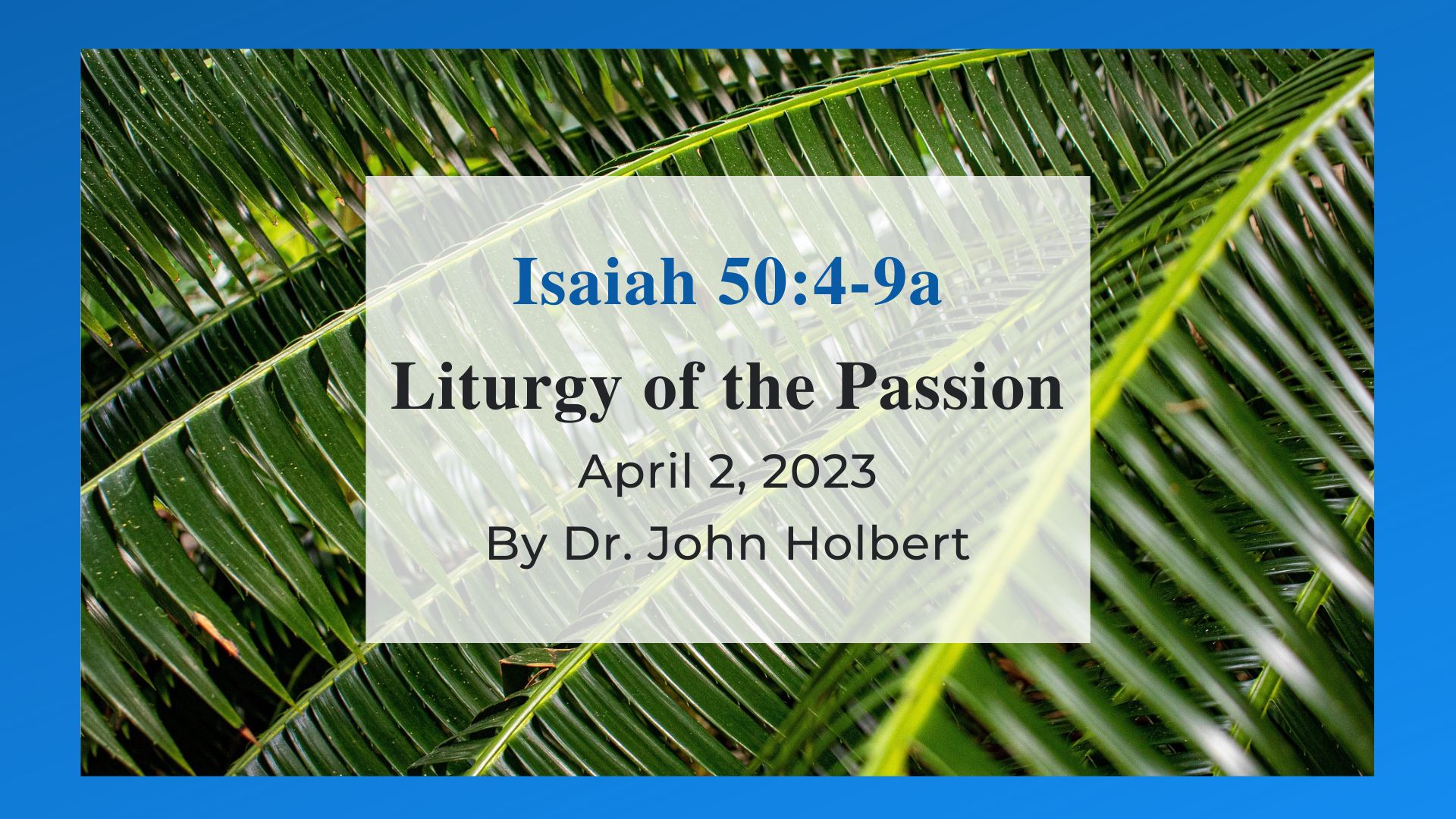Liturgy of the Passion - Reflections on Isaiah 50:4-9a
by Dr. John Holbert on Monday, March 27, 2023

Liturgy of the Passion
Isaiah 50:4-9a
The Peripatetic Hebrew Bible Preacher
Today is either Palm Sunday or Passion Sunday or perhaps both. I imagine your church will have the requisite parade of children, waving their leafy branches. Mark’s Gospel speaks of the crowds spreading their cloaks on the road, along with their branches, but I have never witnessed any church tossing shirts and pants in the aisles, apparently feeling that branches were sufficient for the day. In effect, nearly every church I know celebrates Palm Sunday, rather than Passion Sunday, but today I choose to focus on the text chosen for Passion Sunday, Isaiah’s third Song of the Servant of YHWH.
The four so-called servant songs—found in Is.42, 49, 50, and 52-53—were hugely important to the emerging Christian communities as they sought ways to illuminate the tragic and triumphant events that they celebrated during Holy Week and Easter. This third song, Is.50:4-9, emphasizes for me a crucial facet of my Christian faith, one that is too often overlooked or completely forgotten. Any servant of God, including the one we know as Jesus of Nazareth, is not immune from danger and is not protected from all harm, even by the God who has chosen that servant. In fact, it might well be said that to be a servant of God is to expose oneself to all manner of dangers. Servants who choose to follow the will of God will inevitably open themselves to ridicule, humiliation, and even calumny.
Too often, I hear people claim that true Christianity protects the believer, making her safe and comfortable in the arms of a loving and protective God. Nothing could be further from the truth! Listen carefully to the language used in Is.50, language that the Christian church has long applied to Jesus. “I gave my back to those who struck me, and my cheeks to those who plucked out my beard” (Is.50:6). As one who has long worn a beard, this language hits home! “I did not hide my face from insulting spit” (Is.50:6c). In many cultures, the ultimate form of humiliation is for someone to spit in another’s face, and this is especially true in the Middle East, both in ancient and modern times. God’s servant not only receives assault, not only is his beard pulled out, but he also is humiliated by a gob of spit right in the face. And though the servant will later claim that “all of those who dare claim him to be guilty” will eventually be defeated and shamed by the God of vindication (Is.50:9), that belief in no way vitiates the very real dangers that a genuine servant will undergo.
Any Christian knows full well that such a faith will surely be tested. It is far easier and clearly safer not to announce or parade one’s faith in situations where one will be confronted by genuine danger. Sometimes those dangers may be mortal ones. Those Christians who hid Jews from the Nazis during WWII risked their lives for what they knew was a clear call of their faith. In Pasadena, CA, the rector of the All Saint’s Episcopal Church stood in front of a train in a failed attempt to prevent the transport of hundreds of Japanese-Americans to internment camps under US government demand in 1942. Freedom marchers during the movements for Civil Rights for African-Americans in the 1950s and ’60s were beaten and fire-hosed, and thrown in jail, often under the aegis of Martin Luther King, Jr. and his call for peaceful resistance to unjust segregation laws. True servants of God have been and will be asked to do difficult actions for God.
The cross of Calvary has often been seen as the locus of salvation from human sin, a sort of Green Stamp redemption by the dying Jesus for the world of human evil. Many of us find such a belief abhorrent, suggesting that the God who sent Jesus to die somehow needed that death to assuage divine anger at the wretchedness of the humanity that God had created. It seems to be a sort of sick understanding of a God who needs a bloody death to sweep away the monstrous actions of all humans since the beginning of human history. For me, the cross may be understood far simpler; Jesus’s willingness to die for what he believed so firmly, namely the hope of a richer, fuller life for all people, and the chance for a renewed unity of the whole created order. It was the death of a true servant, one who knew all too well the dangers of convictions that others found dangerous to them. To be faithful is not to be safe; to be faithful is to act for God in situations of profound danger, even mortal danger. That, I think, is what we celebrate on Passion Sunday, and Is.50 offers to us a clarity of vision for that celebration.
